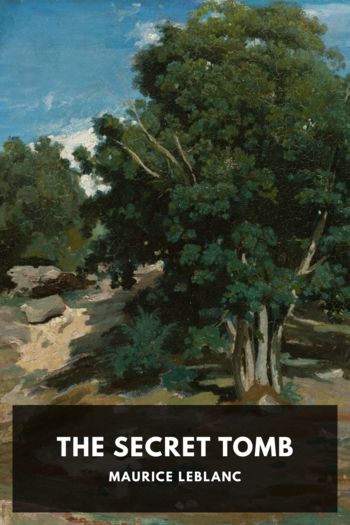The Secret Tomb Maurice Leblanc (best love story novels in english .TXT) 📖

- Author: Maurice Leblanc
Book online «The Secret Tomb Maurice Leblanc (best love story novels in english .TXT) 📖». Author Maurice Leblanc
At last on the eighth day, as the sun shines after unceasing rain, the smile appeared. It did not spring from any outside cause. It was that life recovered its grip on her. Dorothy’s spirit was throwing off the distant tragedy in which her father lost his life. She became the lighthearted, cheerful, and affectionate Dorothy of old. Castor, Pollux, and the captain were smothered with kisses. Saint-Quentin was thumped and shaken warmly by the hand. At the performance they gave under the ramparts of Vitré she displayed an astonishing energy and gayety. And when the audience had departed, she hustled off her four comrades on one of those mad rounds which were for them the most exquisite of treats.
Saint-Quentin wept with joy:
“I thought you didn’t love us any more,” he said.
“Why shouldn’t I love my four brats any more?”
“Because you’re a princess.”
“Wasn’t I a princess before, idiot?”
In taking them through the narrow streets of old Vitré, amid the huddle of wooden houses, roofed with rough tiles, by fits and starts she told them for the first time about her early years.
She had always been happy, never having known shackles, boredom, or discipline, things which cramp the free instincts and deform the disposition. Not that she had been a rebel. She was quite ready to submit to rules and obligations, but she had had to choose them herself; they had had to be such that her child’s reason, already very clear and direct, could accept them as just and necessary.
It had been the same with the education she had given herself: she had only learnt from others that which it had pleased her to know, extracting from the village priest at Argonne all the Latin he knew, and letting him keep his catechism to himself; learning many things with the schoolmaster, many others from the books she borrowed, and very many more from the old couple who farmed her father’s land, in whose charge her parents had left her.
“I owe most to those two,” she said. “But for them I should not know what a bird is, or a plant, or a tree—the meaning of real things.”
“It wasn’t them, however, who taught you to dance on a tight rope and manage a circus,” said Saint-Quentin, chaffing her.
“I’ve always danced on the tight rope. Some people are born poets. I was born a ropedancer. Dancing is part of me. I get that from my mother who was by no means a theatrical star, but simply a fine little dancer, a dancing-girl of the music-halls and the English circus. I see her still. She was adorable; she could never keep still; and she loved stuffs of gorgeous colors … and beautiful jewels even more.”
“Like you,” said Saint-Quentin in a low voice.
“Like me,” she said. “Yes: I take an extravagant pleasure in handling them and looking at them. I love things that shine. All these stones throw out flames which dazzle me. I should like to be very rich in order to have very fine ones that I should wear always—on my fingers and round my neck.”
“And since you will never be rich?”
“Then I shall do without them.”
For all that she had been brought up anyhow, deprived of mentors and good advice, having only before her eyes as example the frivolous life her parents led, she had acquired strong moral principles, always maintained a considerable natural dignity, and remained untroubled by the reproaches of conscience. That which is evil is evil—no traffic in it.
“One is happy,” she said, “when one is in perfect agreement with good people. I am a good girl. If one lets one’s self be guilty of a doubtful action, one repeats it without knowing it and one ends by yielding to temptation as one picks flowers and fruit over the hedge by the roadside.”
Dorothy did not pick flowers and fruit over the hedge.
For a long while she went on telling them all about herself. Saint-Quentin listened open-mouthed.
“Goodness! Wherever did you learn all that? You’re always surprising me, Dorothy. And then how do you guess what you do guess? Guess what is passing in people’s minds? The other day at Roborey, I didn’t understand what was going on, not a scrap of it.”
“Ah, that’s quite another matter. It’s a need to combine, to organize, to command, a need to undertake and to succeed. When I was a child I gathered together all the urchins in the village and formed bands. I was always the chief of the band. Only the others used to rob the farmyards and kitchen-gardens, and go poaching. With me, it was quite the opposite. We used to form a league against an evildoer and hunt for the sheep or duck stolen from an old woman, or again we exercised our wits in making inquiries. Oh those inquiries! They were my strong point. Before the police could be informed, I would unravel an affair in such a way that the country people roundabout came to consult the little girl of thirteen or fourteen that I was. ‘A perfect little witch,’ they used to say. Goodness, no! You know as well as I, Saint-Quentin, if I sometimes play the clairvoyant or tell fortunes by cards, everything I tell people I arrive at from facts which I observe and interpret. And I also arrive at those facts, I must admit, by a kind of intuition which shows me things under an aspect which does not at once appear to other people. Yes, very often I see, before comprehending. Then, most complicated





Comments (0)